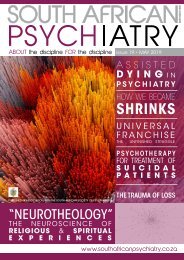South African Psychiatry - February 2019
South African Psychiatry - February 2019
South African Psychiatry - February 2019
Create successful ePaper yourself
Turn your PDF publications into a flip-book with our unique Google optimized e-Paper software.
WINE FORUM<br />
Rewind Raats; does it make a difference? It’s a field<br />
thick with romance. ‘Old vines often reflect the lives<br />
and the culture of the people – the fishermen on the<br />
coast, the sheep farmers inland, the wheat farmers of<br />
the Swartland and the fruit farmers of Piekenierskloof<br />
– and are often preserved by sentiment rather than<br />
budgets,’ avers Kruger. ‘Old vines and the wines they<br />
make are a monument to the farmer’s love of his land.’<br />
Marco Ventrella, head viticulturist at KWV, offers a<br />
scientific perspective. It’s akin to human ageing. As<br />
the vine matures it stores more carbohydrate, making<br />
it more resistant to adverse (especially drought)<br />
conditions due to accumulated reserves. The grapes<br />
reach ‘phenolic ripeness’ – when flavour compounds<br />
are fully developed – earlier. Fruity exuberance and<br />
obvious varietal character may be the preserve of<br />
youth, but wine from more venerable stock has fuller<br />
texture, is better structured, with greater intensity,<br />
palate-weight, and complexity.<br />
BUT IS IT WORTH IT? THE LIFE CYCLE OF<br />
A VINE IS SUCH THAT ITS FRUIT DON’T<br />
CONVERT TO POTABLE WINE FOR THE<br />
FIRST FEW YEARS, THEY GROW INTO<br />
QUALITY PRODUCTION BY ABOUT 10 TO<br />
15 YEARS, AND THEN, ON THE OTHER SIDE<br />
OF 20 TO 30 YEARS OF AGE PRODUCTION<br />
FALLS OFF.<br />
Selling grapes by the ton, a farmer will need to double<br />
prices when yields halve. Or grub up the old vines<br />
for new ones or alternative crops to stay financially<br />
afloat. It’s the OVP’s aim to keep these 20-something<br />
wines in the ground: ‘Encouraging “planting to grow<br />
old”,’ as Morgenthal puts it.<br />
In a University of Cape Town and Stellenbosch<br />
collaboration, Jonathan Steyn and David Priilaid<br />
constructed a hedonic pricing model to investigate<br />
how wine price-setters in the supply chain prioritise<br />
old vine cues, relative to more conventional cues of<br />
worth. ‘In addition to the contribution of established<br />
cues such as aggregate ratings, exemplar brands,<br />
prototypical varieties, and origin, our study confirmed<br />
that vine age contributes significantly to wine price.’<br />
Steyn added that, ‘The introduction of the certified<br />
heritage vineyard seal is an important step and is<br />
likely to sharpen and further shape the category<br />
boundaries globally.’<br />
VinPro, the local wine research body, reports 37% of<br />
wine growers are operating at a loss, 2% break even,<br />
47% make a low profit; only 14% are profitable. A<br />
wine farm needs to generate R40-60 000/ha to be<br />
sustainable, which means making wine that can sell<br />
at R300 a bottle. With 80% of all old vines within the<br />
cooperative system, the OVP is a potential leg up for<br />
that sector into the premium wine market.<br />
The L’Ormarins Old Bush Vine Chenin Blanc was first planted in 1964 on the<br />
Paardeberg Mountain between Malmesbury and Paarl. In 2007/8 these old<br />
bush vines were replanted on the north facing decomposed granite slopes<br />
of L’Ormarins in Franschhoek, where they now produce a single varietal wine.<br />
Photo: Gideon Nel<br />
La Colline, Franschhoek. Semillon planted in 1936<br />
Bellevue Wine Estate Pinotage, 1953<br />
Anthonij Rupert Wines Henk Laing Vineyard, Semillon, Planted 1956<br />
www.oldvineproject.co.za<br />
Andre Morgenthal<br />
Project Manager<br />
andre@oldvineproject.co.za<br />
0826583883<br />
David Swingler is a writer and taster for Platter’s <strong>South</strong> <strong>African</strong> Wine Guide over 21 years to<br />
date. Dave Swingler has over the years consulted to restaurants, game lodges and convention<br />
centres, taught wine courses and contributed to radio, print and other media. A psychiatrist<br />
by day, he’s intrigued by language in general, and its application to wine in particular.<br />
Correspondence: swingler@telkomsa.net<br />
SOUTH AFRICAN PSYCHIATRY ISSUE 18 <strong>2019</strong> * 75
















